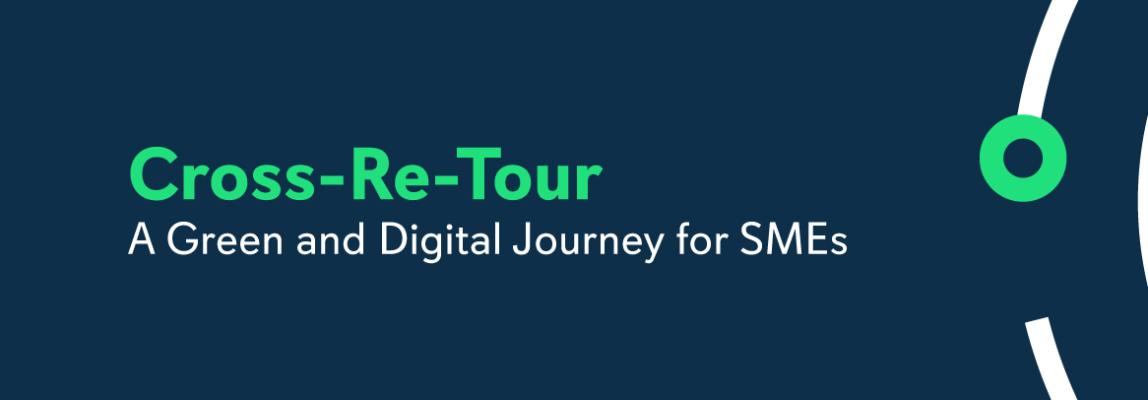
It is the whole ecosystem that benefits
09/30/2024 - 15:13
- Expertise
- Research
The CrossReTour project is initiated by our research groups Tourism Impacts on Society and the Centre for Sustainability, Tourism and Transport (CSTT) and aims to support SMEs in the tourism industry to improve their operational performance by integrating digital, green and circular economy practices. Elisa van den Heuvel – Droll is a lecturer and researcher within the Tourism domain and now also a project leader. ‘This is quite exciting,’ is what she’s saying, but she loves to talk about it.
First of all, why this project?
‘That’s not difficult to answer. A lot of small enterprises are really trying to innovate, but face challenges in regards to knowledge, resources and capacities, while encountering challenges with water and energy usage, waste management, mobility, equipment as well as staff or customer knowledge and behaviour.’
What in fact was the rationale behind starting this project?
‘Actually we did recognise that a lot of innovation has already taken place in other sectors, think of agriculture, manufacturing and health care. The idea is to see if we can use tools and solutions that have already been developed and piloted in other sectors. The tourism industry does not need to re-invent the wheels, but can benefit from advances made elsewhere. And it is needed.’
That, I guess, is the Cross-Tour part; do you have an example?
‘One example is re-using ”grey water” or collecting and re-using stormwater, as is already happening in large-scale industrial environments or urban developments. This principle can also be applied in hotels and on camping sites.’
And what does the project consist of?
‘The project started with stocktaking the challenges SMEs are facing when it comes to sustainable or circular business operations. We have gathered very interesting insights on the drivers of their challenges, their knowledge gaps and needs for pursuing innovation.’
‘We are currently exploring existing technological and digital solutions to see how these can be replicated and imported in the tourism sector. SMEs can then partner up with like-minded businesses or even DMOs, accelerators or research institutes to apply for the open innovation programme and to receive funding of up to €30,000 to implement a cross-sectoral solution in their own businesses. We will support SMEs along the way with mentorship, business advisory services, a capacity building programme (knowledge hub) and a newly developed self-assessment tool (by our partner ARCTUR).’
So, that’s the Cross part; those connections are crucial, I suppose, because we're talking about small enterprises?
‘That’s right, and these enterprises often lack the capacity to make a real change. So, we aim to facilitate these enterprises to join forces. Just think of cooperations between a hotel and a supplier of refurbished matrasses for hospitals, or a restaurant and a supplier of food rejected by supermarkets, to name a few.’
And ‘we’ are?
‘The team so far is made up of my colleagues Jos van der Sterren, Nina Nesterova, Simone Moretti and Erdinç Cakmak. Of course, we are very keen on finding potential synergies between the different research groups active within BUas.’
And you’re the project leader; what is your personal motivation to be involved in this?
‘I find it very interesting and inspiring because there are many different European partners involved, each in their own context and all at a different stage of development. In total eight countries are involved. This means that a lot of alignment is needed and I think I’m good at that. I’m a “bruggenbouwer”, that’s what you call it in Dutch, isn’t it?’
The project has been running for 12 months now and the completion date is set for September 2026. What will happen during that time?
‘The past few months have been marked by discussion and dialogue with tourism companies. What are their struggles and what are their needs when it comes to innovation and sustainability? Now, we are welcoming SMEs to apply for our programme and enter into our services to ultimately prepare a proposal for the call for proposals in autumn 2024 to join the open innovation programme; a 14-month period to implement an innovative project in the areas of water, waste, energy, food, mobility, client or staff nudging, and equipment.’
Apply for what?
‘We have a wide spectrum of services. Just think of mentorship, by ourselves or other experts and webinars. We try to help develop ideas further and find the right partner in the tourism industry or beyond. So basically, we are also a matchmaker. In autumn this year we are opening the call for proposal for SMEs to submit their proposal. Then each country (eight in total, ed.) is going to select ten enterprises which can get additional support plus EU funding of €30,000. These 80 cross-domain partnerships will be supported until September 2026 through a knowledge hub and business innovation advisors.’
That sounds great!
‘And what’s even better, and absolutely worth mentioning, it’s not only the selected individual tourism enterprises that draw advantages, in the end it is the whole industry ecosystem that benefits.’
Read more on the CrossReTour project on BUas.nl
Interview: Maaike Dukker-‘t Hart